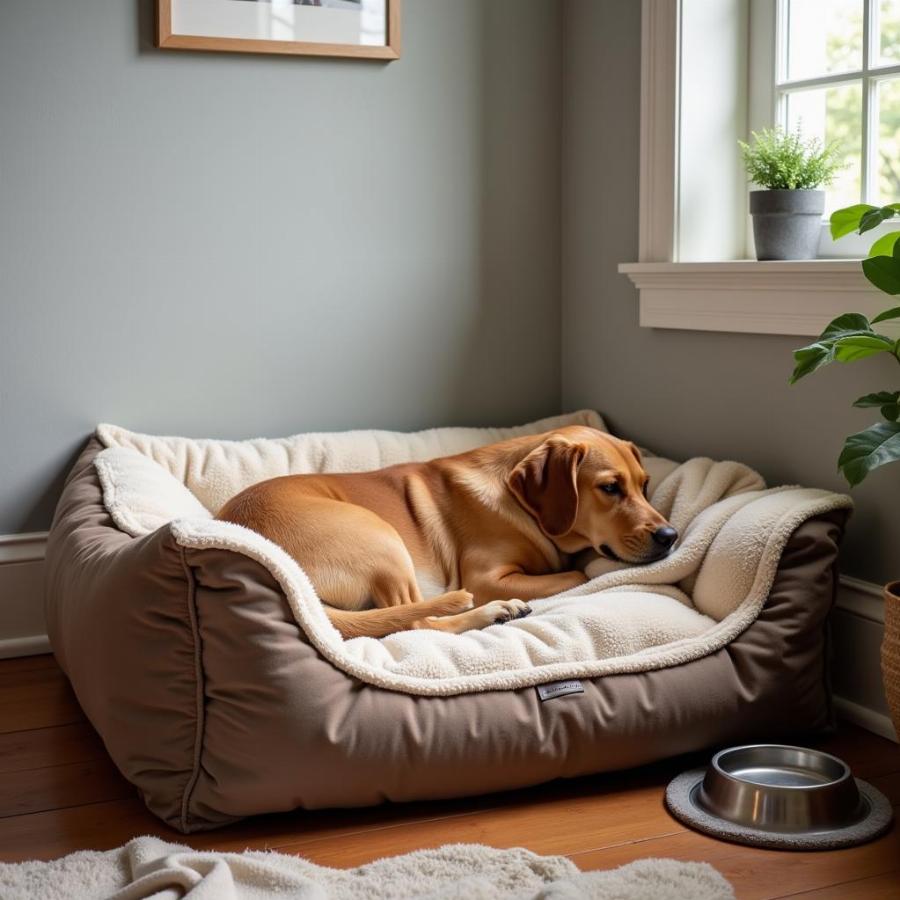Dogs aren’t truly nocturnal, but their sleep-wake cycle does differ from ours. While we’re typically sound asleep, our canine companions can be more active, leading many to wonder, “are dogs nocturnal?” This article will explore the fascinating world of canine sleep patterns, debunking the myth of nocturnal dogs and revealing the truth behind their sometimes mysterious nighttime behaviors. Understanding their natural rhythms can help us provide the best possible care for our furry friends, ensuring they get the rest they need and preventing any unnecessary nighttime disturbances.
Decoding Canine Sleep: Crepuscular, Not Nocturnal
So, are dogs nocturnal creatures of the night? The short answer is no. Dogs are crepuscular, meaning they are most active during dawn and dusk. This crepuscular nature is rooted in their ancestral past as hunters, taking advantage of the low light conditions to stalk prey. While domestication has softened some of these instincts, the crepuscular rhythm often remains, influencing their sleep-wake cycles. This means you might notice your dog becoming more alert and playful in the early morning and evening hours.
Why the Confusion?
The misconception about dogs being nocturnal likely arises from their occasional nighttime activity. A barking dog at 3 a.m. can certainly make it seem like they’re embracing the night. However, this behavior often stems from external stimuli like noises or changes in their environment, rather than a true nocturnal nature.
Understanding Your Dog’s Sleep Cycle
Dogs, like humans, experience different stages of sleep, including REM (rapid eye movement) sleep, where dreaming occurs. However, their sleep cycles are shorter than ours. They tend to experience shorter periods of deep sleep interspersed with periods of lighter sleep, making them more easily roused by noises and disturbances. This explains why your dog might suddenly perk up at the slightest sound, even while seemingly asleep.
Factors Affecting Canine Sleep
Several factors can influence a dog’s sleep patterns, including age, breed, activity level, and overall health. Puppies and senior dogs often require more sleep than adult dogs. Energetic breeds might have more difficulty settling down, while some health conditions can disrupt sleep. Understanding these individual differences is essential for providing appropriate care.
How to Promote Healthy Sleep for Your Dog
Creating a comfortable and predictable sleeping environment can significantly improve your dog’s sleep quality. A dedicated dog bed in a quiet area of the house can help them feel secure and relaxed. Establishing a regular sleep schedule, with consistent wake-up and bedtime routines, can also promote healthy sleep habits.
Tips for a Peaceful Night
Ensuring your dog gets enough physical exercise and mental stimulation during the day can tire them out and promote sounder sleep at night. Avoid feeding them large meals or engaging in vigorous play close to bedtime. If your dog experiences excessive panting in dogs at night, it might be worthwhile to investigate the cause. You can find more information about this topic in our article on excessive panting in dogs at night.
 Cozy Dog Bed in Quiet Corner
Cozy Dog Bed in Quiet Corner
Addressing Nighttime Activity
If your dog is frequently active at night, it’s crucial to rule out any underlying medical issues. Anxiety, pain, or cognitive decline can contribute to nighttime restlessness. Consult with your veterinarian to determine if there’s a medical reason for the behavior. You might also find our article on why do dogs have glare in their eyes on camera helpful in understanding some of the more unusual behaviors dogs can exhibit.
Training and Management
Training can play a vital role in managing nighttime activity. Teaching your dog to settle down on command and rewarding calm behavior can help them learn to relax at night. Providing appropriate chew toys or puzzle feeders can also keep them occupied and prevent boredom-induced restlessness. If you’re interested in specific breeds, you might find our resource on coon dogs for sale useful.
Conclusion
While dogs are not nocturnal, their crepuscular nature and unique sleep cycles can sometimes lead to nighttime activity. By understanding their natural rhythms and addressing potential underlying causes, we can help our furry companions get the restful sleep they need. Creating a comfortable environment, establishing a routine, and providing adequate exercise are key to ensuring a peaceful night for both you and your dog. For more information about dog care, consider reading our article about skunk shampoo for dogs.
FAQ
- Are dogs truly nocturnal? No, dogs are crepuscular, meaning they are most active during dawn and dusk.
- Why does my dog seem more active at night sometimes? External stimuli, anxiety, or medical issues can contribute to nighttime activity.
- How can I improve my dog’s sleep? Create a comfortable sleeping environment, establish a routine, and provide enough exercise.
- What should I do if my dog is excessively restless at night? Consult with your veterinarian to rule out any underlying medical conditions.
- Is it normal for dogs to have shorter sleep cycles than humans? Yes, dogs typically experience shorter periods of deep sleep than humans.
- How can I help my dog settle down at night? Training, providing calming aids, and offering appropriate chew toys can help.
- Does my dog’s breed affect their sleep patterns? Yes, some breeds are naturally more energetic and may require more activity to sleep soundly.
Explore More
Are you curious about more dog-related topics? Check out our articles on canine behavior, training tips, and breed-specific information. You can also download our free PDF guide, “curious dog in the nighttime pdf,” for more insights into your dog’s nighttime behavior.
Beaut Dogs is your one-stop resource for all things related to your beloved canine companion. We provide expert advice, helpful tips, and in-depth information on dog breeds, care, and training. When you need support, contact us at Email: [email protected] to receive detailed and accurate answers from Beaut Dogs. Visit us at https://beautdogs.com today and discover the wonderful world of dogs!